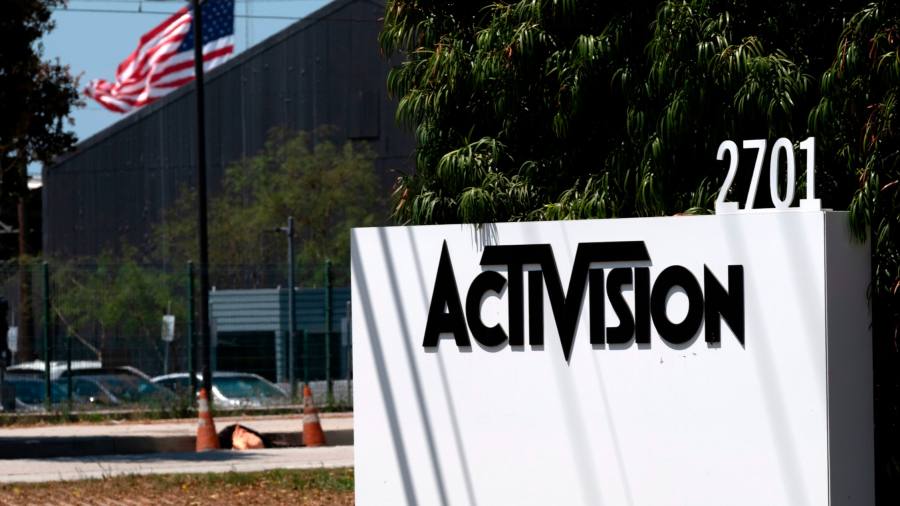Receive free Microsoft Corp updates
We’ll send you a myFT Daily Digest email rounding up the latest Microsoft Corp news every morning.
Microsoft sought to paint rival Sony as the main agitator behind regulatory moves to block its $75bn purchase of gaming company Activision Blizzard, as it faced off against US antitrust regulators in court on Thursday for the first time in nearly a quarter-century.
A top executive at the Japanese company at first dismissed the idea that the deal could lead to anti-competitive behaviour before Sony reversed course and became the “complainer-in-chief” against it, a lawyer for Microsoft said at a hearing in a San Francisco federal courtroom.
The hearing follows an application from the US Federal Trade Commission 10 days ago seeking an injunction to prevent the software company from closing its Activision purchase until a separate antitrust case brought by the agency has been heard.
The clash marks the first time Microsoft has faced off against the US over an antitrust case since the Department of Justice accused it of using illegal means to maintain its PC monopoly in the 1990s. A court went on to order a break-up of the company in 2000, though the order was overturned on appeal and the case was later settled.
In opening arguments, FTC lawyer James Weingarten said Microsoft would have “the ability and incentive” to harm competition after the deal by withholding some of Activision’s games from competitors or by raising prices or degrading the content in a way that made the games less attractive on rival platforms.
He said the agency would present “a lot of evidence” during the hearing about how Microsoft had reneged on a promise not to withhold games after the similar acquisition of gaming company ZeniMax.
The potential for Microsoft to withhold Call of Duty, Activision’s most popular game, from Sony’s PlayStation has become a central issue in the case. Beth Wilkinson, appearing for the companies, said the financial model for the deal that Microsoft had presented to its board turned on continuing to make the game available on PlayStation, and that it would hurt customers of its own Xbox console if they could not play against people on the Sony console.
Microsoft said in a court filing last week that it offered Sony a 10-year licence to Activision games and claims the Japanese company had rejected the offer in an attempt to kill the acquisition.
Wilkinson also read from an email written by Jim Ryan, head of Sony Interactive Entertainment, saying that Microsoft’s planned acquisition “is not an exclusivity play at all”, adding: “I’m pretty sure we’ll see CoD on PlayStation for many years to come.”
Sony did not immediately return a request for comment.
The FTC first took action to block the Activision deal late last year, launching a case in administrative court that is scheduled to begin on August 2. However, it turned to federal court earlier this month to prevent the companies closing the deal before then, something it said would prevent any harm to competition while its case is being considered.
The agency claims that after the acquisition, Microsoft would have a strong financial incentive to turn Activision’s most popular games into exclusive properties available only on its own platforms. It claimed this would hurt competition in the separate markets for console gaming, games libraries available through subscription, and cloud gaming.
The FTC’s objections are more sweeping than those of the UK’s Competition and Markets Authority, which has only sought to block the deal over potential harm to the nascent cloud gaming market. The European Commission has approved the transaction.
An 18-month deadline for Microsoft to complete the purchase expires on July 18, adding to the pressure to close the transaction before the FTC’s administrative law case begins. The software company would have to pay a $3bn break-up fee if it fails to complete the deal. In their filing last week, the companies claimed that because of this, a preliminary injunction delaying the close “would . . . almost certainly scuttle the transaction”.
Both companies have lobbied hard for the acquisition to be allowed to go through on its original terms, and one person close to the situation said they could easily agree to extend their deal if the FTC succeeds in blocking it from immediately closing.
The chief executives of Microsoft, Satya Nadella, and Activision’s Bobby Kotick, are among the witnesses scheduled to appear in person at the five-day hearing.
Read the full article here




